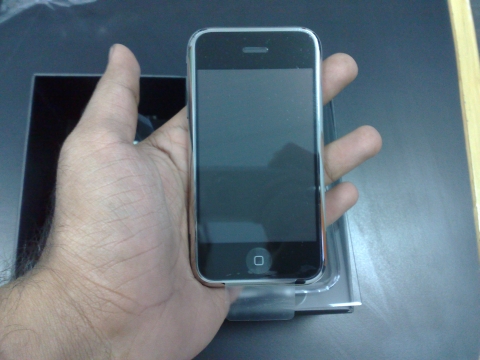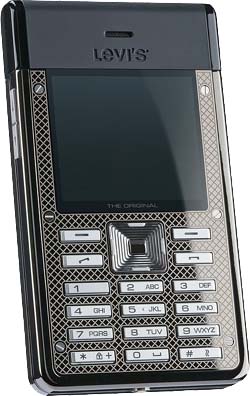It seems that Apple SDK for their iPhone is really something to watch out for; first it was Gameloft announcing 3D games for the iPhone, then the touch screen mobile version of the popular building blocks game Lego and now according to latest news in the media the Apple SDK has been downloaded 100,000 time in four days. Continue reading “Apple iPhone SDK downloads cross 100000 mark”
Real Bluetooth Virtual Keyboard Live Pics
In case you feel the need for a full keyboard on your mobile phone and you don’t have that QWERTY keypad on your handset then this Bluetooth Virtual Keyboard might seem attractive to you !

The Device works over Bluetooth and an Infrared Beam .. You need to pair this device to your mobile phone as a Bluetooth keyboard and you can place it on a flat surface and Voila ! a full virtual keyboard at your disposal ..
Continue reading “Real Bluetooth Virtual Keyboard Live Pics”
Position Art with Nokia N82 GPS by Stavros in Rome
Seems like Nokia is pushing the N82 a lot these days . The latest event for the same is called The World Is My Canvas
Can you spot the famous logo in the drawing above ?
At least the men might be knowing .. The event is about a crazy guy named Stavros who is performing Position Art in the
streets of Rome using his cool Nokia N82
Continue reading “Position Art with Nokia N82 GPS by Stavros in Rome”
No ban on BlackBerry yet in India Phew!
I have been a Reliance user for the past few years and when I wanted to upgrade my handset, I opted for the BlackBerry.
I am exceedingly happy with the handset. Although it does look a bit plasticky, but the Push Inbox and the ease of internet access on the move is just extraordinary. (I mean on my way to the airport a few weeks ago, I did a web check-in as I was getting late reaching the airport thanks to traffic snarls).
Imagine my shock when I read in a news item that the Blackberry was going to be blacked out soon as the Indian Government perceived it as a security threat.

The government had asked Research in Motion (RIM) to provide them with access to algorithms required to decrypt BlackBerry messages latest by March 31st else face a total ban on the service in India.
The latest on that front is that BlackBerry service in the country will get a breather. Continue reading “No ban on BlackBerry yet in India Phew!”
BPL Mobile Jukebox launched
BPL Mobile Jukebox, a mobile radio service that will allow its subscribers to listen to their choice of music while they are on the move was launched recently.

Your Jukebox will greet you in your preferred language and customise your music according to your choice. The Jukebox will keep a track of your preferred music according to category and choices. For instance, if you skip certain songs belonging to certain categories 5 times, the jukebox will not play them for you and will switch to another mood/category.
The genre of songs available will range from Ghazals to Bollywood, Devotional, Retro (English & Hindi) and Regional music.
The service will be available to both post-paid and pre-paid subscribers of BPL Mobile and also accessible on a basic entry-level Non-Data enabled handset. Continue reading “BPL Mobile Jukebox launched”
Lego on iPhone

Apple released its new SDK for the iPhone and its raining applications for the sexy touch screen gadget. First it was Gameloft who made an announcement that they will be launching as much as 15 3D games for the iPhone based on the new SDK and now it is time for the all time favorite Lego Building blocks to come on iPhone. Continue reading “Lego on iPhone”
Aamir says, Jo Jeeta, Wohi Samsung
Few months back Nokia appointed Shahrukh Khan as their brand ambassador in India for their mobile phone business. Nokia being the number one player in India wanted to go with the Number 1 Khan. Samsung on the other hand didn’t want to settle for less and has roped in the other Khan who is Number 1 in his own ways. Aamir Khan has been appointed as the brand ambassador for Samsung mobile phones. Continue reading “Aamir says, Jo Jeeta, Wohi Samsung”
Sony Ericsson launches C702 and C902 Cyber-shot
While Sony Ericsson recently appointed Maria Sharapova as its global brand ambassador, it got tennis sensations Anastasia Rodionova (4th seed), Yaroslava Shevdova and Patty Schnyder to launch the Sony Ericsson C702 and C902 at the Sony Ericsson sponsored WTA Tour at Bangalore.

Sudhin Mathur, General Manager, Sony Ericsson India said, “This is our third consecutive year of participation in the Sony Ericsson WTA Tour event in Bangalore, and we are excited to have Anastasia Rodionova, Yaroslava Shevdova and Patty Schnyder with us to unveil these new Cyber-shot phones here in India today. The C702 and C902 both place ease-of-use and best-in-class picture quality at the heart of their design. Yet both appeal to different audiences. One is engineered to let you take more pictures in more places and the other is designed to look as stunning as the pictures it takes.”
The two handsets are part of its Cyber-shot range. Continue reading “Sony Ericsson launches C702 and C902 Cyber-shot”
Apple iPhone 16GB Unboxing FoneArena Exclusive
The Apple iPhone 16GB was announced only few weeks back Feb 6 to be precise

As we promised yesterday , Here are the unboxing pictures of the 16GB iPhone
Hope you enjoy seeing these pictures Continue reading “Apple iPhone 16GB Unboxing FoneArena Exclusive”
Samsung F110, or the Adidas miCoach launched
Samsung has partnered with Adidas to launch the Samsung F110, or the Adidas miCoach.
Equipped with a web-based analysis tool that can help you with your sport needs, the miCoach has a heart rate monitor, which makes use of a belt that measures your heart beat off your chest.

It also has the accelerometer and the pedometer, the phone gives you a real-time voice-coaching during workouts. The phone can also read out your current stats like time, calories, heart rate etc.
Wow! Continue reading “Samsung F110, or the Adidas miCoach launched”
3D games coming soon on iPhone courtesy Gameloft
Apple iPhone and games was some wired combination till now. I have never seen somebody talking about iPhone and games that are being played on it and any communities that are dedicated to iPhone gaming. Continue reading “3D games coming soon on iPhone courtesy Gameloft”
Apple iPhone 8GB Live Pics
Its been raining phones here at FoneArena .. I have been able to test so many phones over the past one month.. N82 , N95, N81 8GB , N95 8 GB and now the iPhone 8 GB ..

Doesn’t this box look sexy ? Now see the screen saver below

Nokia N95 8GB Live Pics
I got a chance last week to play around with the Nokia N95 8GB phone !
The first thing tat grabs my attention in this phone is the awesome screen..

Dont you find the display impressive ? The feel of the phone was prerty similar to the N95 but it was slightly broader due to the increased screen size..
Tata Consultancy Services to provide R & D to Nokia Siemens
India, long considered a country without adequate technical prowess especially in the filed of R&D is now set to break the myth.
Nokia Siemens Networks selected Tata Consultancy Services to provide R&D Services through partial transfer of Nokia Siemens Networks’ Development Center tasks in Düsseldorf, Germany.
![]()
 Continue reading “Tata Consultancy Services to provide R & D to Nokia Siemens”
Continue reading “Tata Consultancy Services to provide R & D to Nokia Siemens”
Levis Phone, Inspired by Denim
 Levis is always associated with jeans and cowboys getting hold of their cattle on the countryside. The company has recently ventured into other men and women accessory. With mobile phone becoming an important accessory of today’s urban individual Levis doesn’t want to be left behind on this front. Continue reading “Levis Phone, Inspired by Denim”
Levis is always associated with jeans and cowboys getting hold of their cattle on the countryside. The company has recently ventured into other men and women accessory. With mobile phone becoming an important accessory of today’s urban individual Levis doesn’t want to be left behind on this front. Continue reading “Levis Phone, Inspired by Denim”

